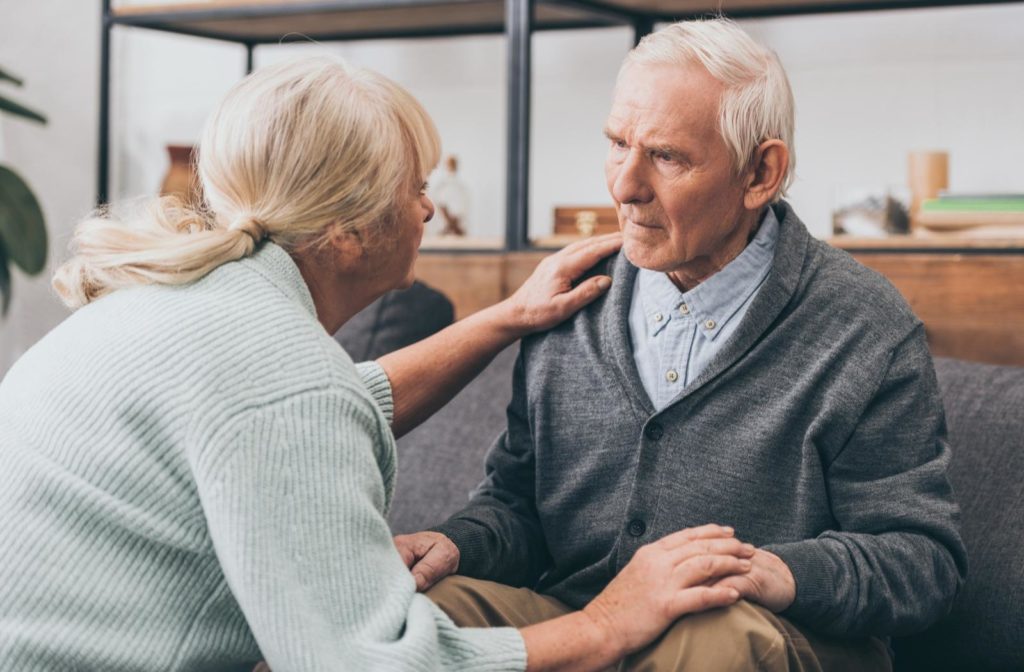Communication is an integral part of our lives and is more than just talking and listening. It allows us to exchange information, share knowledge, and develop relationships with the people around us.
Because communication is such a vital part of our lives, especially in our relationships, it can be difficult for everyone when a loved ones’ communication is affected by dementia. For some caregivers, not communicating with their loved ones properly can make them feel like they can’t relate to them or aren’t doing enough to help them.
If you’re feeling this way- don’t worry. At Meadowcrest, we are passionate about making every day a good day for our residents in memory care. We realize the importance of communication for people with age-related memory issues, and we’re here to share our expertise with you.
Our goal is to help you keep your loved ones engaged and supported, no matter their diagnosis.
Keep reading to learn more about the stages of dementia, how communication is impacted in each stage, and how you can approach communication with your loved one.
Alzheimer’s & Dementia Explained
What is Dementia?
Dementia is a general term that refers to any sort of memory loss or decision-related condition that affects a person’s daily life.
What is Alzheimer’s?
Alzheimer’s disease is the most common type of dementia. It is a progressive disease that affects memory, thought, and language.
Although Alzheimer’s primarily affects older adults, it is not considered a normal part of aging.
The 3 Stages of Dementia
There are 3 stages of dementia. Communication may be affected in each stage, but typically communication issues don’t start until the middle to late stages.
Early Dementia
A person with early or mild dementia can still live independently. However, most likely, they will have memory lapses that may or may not affect their day-to-day activities.
Middle Dementia
The middle, or moderate stage of dementia is usually the longest. In this stage, you might notice that your loved one:
- Forgets or misuses common words
- Is often over-emotional or reactive
- Have difficulties expressing themselves
- Struggle to complete everyday tasks.
Late-Stage Dementia
In the final stage of dementia, people progressively lose the ability to engage with what’s happening around them. They may still be able to talk, but communicating and expressing themselves can become increasingly difficult.

How does Alzheimer’s & Dementia Affect Communication?
If your loved one has Alzheimer’s or dementia, you may notice a change in how they communicate over time.
This symptom affects everyone differently and is based on what stage of the disease process they’re in.
Your loved one’s dementia may be affecting their communication skills if they:
- Have difficulty finding the correct words
- Use familiar words or phrases repeatedly
- Describe objects instead of naming it
- Lose their train of thought easily & often
- Say some sentences out of order
- Revert to speaking a native language
- Have gotten quieter or speak less often
- Using gestures in the place of some words
- Forget the meaning of a well-known word
- Lose their focus when other people talk
If you’ve noticed a decrease in your loved ones’ communication skills, talk to your doctor. Your doctor can recommend memory therapies, services, or programs to help your loved one reach their full potential.
How to Approach Communication
If your loved one has been diagnosed with Alzheimer’s or dementia, follow these tips to promote effective and compassionate communication:
Before Speaking
For best results, you should do the following before speaking to your loved one:
- Reduce noisy distractions in the environment
- Make eye contact with them & use their name when talking
- Make sure they have working hearing aids & clean glasses
- If your loved one struggles to recognize people, introduce yourself
- Get close enough so they can see your expressions & gestures
While Speaking
When you speak to your loved one, you should:
- Speak clearly, at a slower pace, and use simple sentences
- Ask “yes” or “no” or close-ended questions
- Give them your full attention, show respect & patience
How to Listen
When your loved one is speaking to you, you should:
- Listen carefully and watch for verbal and non-verbal cues
- Be patient and try not to interrupt the person when they’re talking
- Use actions or body movements as well as words during conversation
General Tips to Create a Positive Space for Communication
To boost your loved ones confidence and help them work on their communication skills, you should:
- Try to include your loved one in conversations with others
- Meet your loved ones where they are and accept their new reality
- Always ensure you’re creating a supportive, reassuring environment
- Consider alternate ways of expression through other activities
Additional Resources
For more information on communication & dementia, check out the following resources:
Communication Strategies Webinar
Communication information sheet
Alzheimer’s Association local resources finder
Dementia Education and Referral Center
If you have any questions or concerns, don’t hesitate to contact us! Our team is always happy to assist you.






